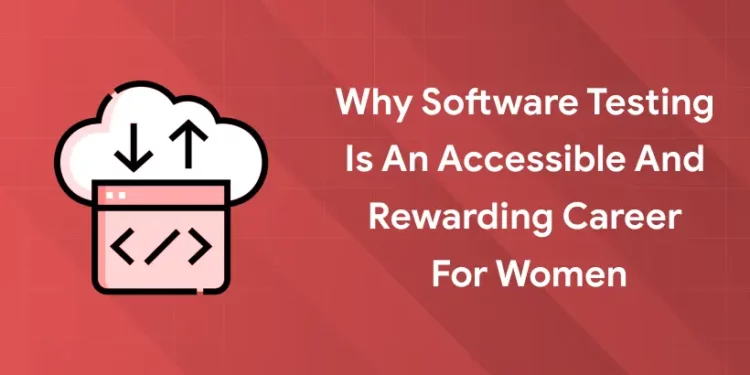Table of Contents
Key Takeaways:
- High Demand: Software testing is a rapidly growing field with a wide range of opportunities.
- Accessible Entry: Many roles in software testing require soft skills like attention to detail and communication, making it easier for women to enter the industry.
- Career Growth: There are diverse career paths in software testing, from manual testing to automation and leadership roles.
- Work Flexibility: Many software testing roles offer flexible work arrangements, including remote work and flexible hours.
- Future Opportunities: Emerging trends like automation, AI, and cloud-based testing are reshaping the field and creating new specializations.
Introduction
In recent years, software testing has gained prominence as an ideal career path for women in the tech industry. Traditionally, women have been underrepresented in technology-related fields, but software testing is one area where they are increasingly excelling. This blog explores why software testing is an accessible and rewarding career for women looking to break into tech.
Many women are drawn to software testing for its practical nature and the fact that it doesn’t require an in-depth knowledge of programming at the outset. Instead, it offers a great entry point into the world of technology. From flexible work options to high demand and growth opportunities, here’s why software testing is an excellent choice for women looking for a tech career.
What Makes Software Testing Accessible?
1: What is software testing?
1. Minimal Technical Prerequisites
Unlike other tech roles that require a deep understanding of complex programming languages or algorithms, software testing allows individuals to enter the field with a basic understanding of technical concepts. Many of the fundamental skills required in testing, such as problem-solving, critical thinking, and communication, are transferable from other professions.
Moreover, software testing often involves the use of specific testing tools and frameworks that simplify the process, making it easier for those without extensive coding experience to succeed.
For example, manual testing — one of the most common types of testing — primarily requires individuals to carefully review software and identify issues from a user’s perspective, a skill that many women naturally excel at.
Entri’s Software Testing Course offers structured learning that helps newcomers build a strong foundation in software testing, even without prior experience in programming. This course includes both manual and automated testing techniques, making it an ideal starting point for women looking to enter the field.
Develop a foundational understanding in Software Testing through our free materials!
2. Flexible Work Arrangements
One of the most attractive aspects of software testing is the flexibility that many roles offer. The field is known for its potential for remote work, flexible hours, and even part-time opportunities. For women who have caregiving responsibilities or other commitments, this flexibility is invaluable.
3. High Demand Across Industries
The need for software testers continues to grow as businesses and organizations rely more on software for their day-to-day operations. The demand for quality assurance professionals is higher than ever, with companies in every sector, from healthcare to finance and entertainment, needing testers to ensure the functionality, security, and usability of their applications.
According to the U.S. Bureau of Labor Statistics, the employment of software quality assurance analysts is projected to grow 17% from 2023 to 2033. This rapid growth means there are numerous job opportunities, making it an ideal time for women to enter the field.
Master Testing Skills with Industry Experts
Become a Test Engineer: Learn Core Skills from Industry-Leading Mentors and Land High-Paying Testing Jobs!
Explore ProgramEmpowering Women in Software Testing
1. Supportive Communities and Networks
The tech industry, while once male-dominated, is increasingly inclusive, with several initiatives aimed at empowering women. Organizations like Girls Who Code, Women Who Code and Code First Girls focus on providing women with the support they need to thrive in the tech world.
These organizations offer coding boot camps, mentorship programs, and networking opportunities, helping women get their foot in the door and connect with other like-minded professionals. These groups also provide platforms to address challenges faced by women in the tech industry, making it easier for women to succeed.
2. Real-Life Success Stories
Many women have successfully transitioned into software testing roles, demonstrating that the field is not only accessible but also an empowering career choice. For example, take the story of a 44-year-old woman who made a career shift into software testing after years in a completely different profession. She described the process as both challenging and rewarding, citing the support from her online community and mentorship programs on Reddit.
These stories serve as powerful examples that software testing can be a successful career for women, even those with no prior technical background.
3. Role Models and Leaders
Women like Angie Jones, who is a Senior Developer Advocate at Applitools, have made significant contributions to software testing. She’s a leading advocate for women in tech and a role model for aspiring software testers. Women in positions of influence like Jones are helping shape the future of the industry and paving the way for other women to succeed in the field.
Getting Started in Software Testing
1. Explore Training Programs
One of the most effective ways to break into software testing is through formal training programs that teach both manual and automated testing techniques. Entri’s Software Testing Course is designed to provide individuals with a solid understanding of both aspects of software testing, preparing them for real-world challenges.
The course covers essential topics like test case design, defect reporting, automation tools, and more. It also emphasizes practical, hands-on learning, ensuring that students can apply their knowledge in real-world scenarios.
2. Build Practical Experience
Experience plays a critical role in software testing. Whether through internships, volunteering, or side projects, gaining hands-on experience is essential for building a strong portfolio. Women can start by testing open-source projects, participating in bug bounty programs, or contributing to quality assurance for smaller software companies.
Many online platforms also offer simulation tools that let learners practice their testing skills on real-world applications. This practical exposure will boost a candidate’s confidence and marketability.
3. Join Professional Communities
Networking is vital in any industry, and the tech world is no exception. Attending tech meetups, participating in online forums, and connecting with professionals in the field are great ways to build a career in software testing. Women who network with others in the industry often find that they have access to more job opportunities, mentorship, and support.
The Importance of Software Testing in the Development Lifecycle
Software testing is a crucial step in the software development lifecycle(SDLC) that ensures the quality, reliability, and security of software products. As technology continues to shape every aspect of our lives, the demand for reliable and functional software grows. This is where testing comes in—helping businesses create software that meets user expectations and performs as intended.
Why is Software Testing Essential?
-
Quality Assurance: Software testing helps to identify and fix defects or bugs in software before it reaches the end user. This improves the overall quality of the software and ensures it delivers the promised functionalities. Without thorough testing, software can fail in production, causing businesses to lose time, money, and customer trust.
Also read Difference Between Testing and Debugging
-
User Satisfaction: One of the core goals of testing is to verify that the software meets the needs and expectations of users. Usability testing ensures that the software is intuitive, easy to navigate, and provides a seamless experience, ultimately boosting customer satisfaction.
-
Cost-Effective: While testing may seem time-consuming, catching bugs early in the development process is far more cost-effective than addressing them after the product is launched. Studies show that fixing defects in the design or development phase can be 30 times cheaper than fixing them post-release.
-
Security and Performance: Software testing is not just about ensuring functionality; it also involves performance testing to verify how software behaves under various conditions and load. Security testing ensures that there are no vulnerabilities that hackers could exploit, particularly important in fields like finance, healthcare, and e-commerce.
-
Regulatory Compliance: For industries that are regulated by government bodies (e.g., healthcare, finance), testing is critical to ensure that the software complies with industry standards and regulations. Failure to comply could result in legal penalties or damage to an organization’s reputation.
Software testing, therefore, plays a critical role in mitigating risks, ensuring user satisfaction, and maintaining the reputation of businesses. Without thorough testing, software is vulnerable to errors that can lead to costly fixes and damage to a company’s brand.
Master Testing Skills with Industry Experts
Become a Test Engineer: Learn Core Skills from Industry-Leading Mentors and Land High-Paying Testing Jobs!
Explore ProgramPopular Career Paths in Software Testing
Software testing is a dynamic field that offers numerous opportunities for career growth. Whether you’re just starting or looking to advance, multiple roles within testing cater to various interests and skill sets. Here are some popular career paths within software testing:
1. Manual Tester
Manual testing is the most traditional and entry-level form of software testing. As a manual tester, your primary responsibility is to test software without using automation tools. You’ll create test cases based on software requirements, execute them, and report defects to the development team.
-
Skills Required: Analytical thinking, attention to detail, communication, and creativity.
-
Growth Potential: Manual testers often transition into automation or lead roles as they gain more experience and expertise.
Prepare for interviews with Top Manual Software Testing interview Questions
2. Test Automation Engineer
A test automation engineer focuses on creating automated test scripts to test software. Automation testing allows testing to be done more efficiently and is especially important for large applications or applications with frequent updates.
-
Skills Required: Knowledge of programming languages such as Python, Java, or JavaScript, as well as experience with test automation frameworks like Selenium, TestNG, or JUnit.
-
Growth Potential: This role is often seen as a specialization in the software testing career path, and it opens doors for roles like Senior Test Engineer or QA Architect.
Know more at Automation Tester Career Path
3. Performance Tester
Performance testers focus on ensuring the software functions efficiently under various conditions, such as heavy traffic or high demand. This involves stress testing, load testing, and evaluating the overall performance and scalability of the application.
-
Skills Required: Understanding of performance testing tools like JMeter, LoadRunner, or Apache Benchmark, and knowledge of how systems perform under heavy usage.
-
Growth Potential: Performance testers can move into higher-level roles in software architecture or become specialized consultants.
Prepare for interviews with Accenture Performance Testing Interview Questions
4. Test Lead/Manager
A test lead or test manager oversees a team of testers and is responsible for managing testing activities across the entire development lifecycle. They ensure that the testing process is efficient, that testing goals are met, and that quality standards are maintained.
-
Skills Required: Leadership, project management, communication, and a deep understanding of the testing process.
-
Growth Potential: Test leads can advance to senior management roles or QA Director positions.
Prepare for interviews with Accenture Test Manager Interview Questions
5. Quality Assurance (QA) Consultant
QA consultants work with organizations to improve their testing processes, help implement best practices, and ensure that the software development lifecycle is optimized. They often work as freelancers or as part of consulting firms.
-
Skills Required: Expertise in software testing methodologies, excellent communication skills, and a good understanding of industry standards.
-
Growth Potential: Consultants often work with multiple clients, providing diverse opportunities and challenges in the testing industry.
6. QA Architect
QA Architects are responsible for designing and building testing frameworks and strategies for large-scale software projects. They help implement the tools and processes that drive the organization’s testing practices, including automated testing infrastructure.
-
Skills Required: Extensive experience with testing tools and frameworks, knowledge of system architecture, and a deep understanding of the software development process.
-
Growth Potential: QA architects often transition into roles like Test Strategy Lead or Chief Technology Officer (CTO).
The Future of Software Testing: Trends to Watch
As the tech industry continues to evolve, so does the field of software testing. Emerging trends are transforming the way testing is done and creating new opportunities for testers to specialize in cutting-edge technologies.
1. Automation and AI in Testing
The rise of automation tools and AI is making software testing faster, more efficient, and less prone to human error. Automated testing allows testers to run repetitive test cases quickly and consistently, freeing up time for more complex testing tasks. Artificial intelligence is increasingly being used to create smarter tests that can adapt and predict software issues more effectively.
Example Tools: Selenium, Cypress, Appium, and TestComplete.
Also read: Top Automation Tools Manual Testers Should Master
2. Continuous Integration and Continuous Testing
As businesses adopt DevOps and Agile methodologies, continuous integration (CI) and continuous testing are becoming more popular. With CI, code changes are automatically integrated and tested throughout the development process. This allows for faster feedback and more reliable software releases.
Example Tools: Jenkins, Travis CI, CircleCI.
3. Cloud-Based Testing
Cloud-based testing tools allow testers to run tests across different browsers, devices, and platforms without the need for physical hardware. This is especially important in today’s mobile-first world, where software must be compatible with a variety of devices and operating systems.
Example Tools: BrowserStack, Sauce Labs, TestingBot.
4. Security Testing and Vulnerability Assessments
With the increasing number of cyberattacks, security testing has become an essential part of the testing process. Testers need to ensure that the software is not only functional but also secure. Vulnerability assessments, penetration testing, and code reviews are now crucial steps in the QA process.
Example Tools: Burp Suite, OWASP ZAP, Fortify.
5. Shift Left Testing
Shift-left testing is a practice that involves testing early in the software development process to identify defects as soon as possible. This reduces the time and cost of fixing bugs and helps improve the overall quality of the software.
Know more at Future Scope of Software Testing: Career, Jobs, and Skills
Conclusion
Software testing is a field that offers a unique combination of accessibility, flexibility, and growth opportunities, making it an excellent choice for women looking to enter the tech industry. With the rising demand for software testers and the support of various professional networks, there has never been a better time to start a career in this field.
If you’re looking to build a successful career in software testing, Entri’s Software Testing Course is an excellent place to start. With comprehensive training and practical experience, you’ll be well-equipped to succeed in this growing industry.
Frequently Asked Questions
Do I need a technical background to start a career in software testing?
No, you don’t need an extensive technical background to start a career in software testing. Many roles focus on skills like attention to detail, communication, and problem-solving. With the right training, anyone can break into the field.
Are there opportunities for career advancement in software testing?
Absolutely! As a software tester, you can advance into roles like test lead, test manager, or automation engineer. Software testing is also a great stepping stone into other areas of tech like development and product management.
How can I find support as a woman entering the tech industry?
Numerous organizations and communities focus on supporting women in tech. Joining platforms like ‘Women Who Code’ and participating in networking events can provide valuable connections and mentorship.
Do I need a technical background to start a career in software testing?
No, you don’t need an extensive technical background to get started. Many software testing roles prioritize skills like attention to detail, problem-solving, and communication. While a basic understanding of programming can help, it’s not a requirement. Entri’s Software Testing Course is designed for beginners and helps build
Software testing offers diverse career paths, including:
-
Manual Tester: Start as a manual tester and move to automated testing.
-
Test Automation Engineer: Specialize in writing scripts for automation tools like Selenium.
-
Performance Tester: Focus on testing software performance under various conditions.
-
Test Lead/Manager: Oversee testing teams and manage projects.
-
QA Consultant: Advise organizations on best testing practices.
-
QA Architect: Design and implement testing strategies for large systems.
Each of these roles offers opportunities for growth, depending on your skills and interests.
a strong foundation in both manual and automated testing.
What career paths are available in software testing?
Software testing offers diverse career paths, including:
-
Manual Tester: Start as a manual tester and move to automated testing.
-
Test Automation Engineer: Specializes in writing scripts for automation tools like Selenium.
-
Performance Tester: Focus on testing software performance under various conditions.
-
Test Lead/Manager: Oversee testing teams and manage projects.
-
QA Consultant: Advise organizations on best testing practices.
-
QA Architect: Design and implement testing strategies for large systems.
Each of these roles offers growth opportunities, depending on your skills and interests.
Are there growth opportunities for women in software testing?
Absolutely! Software testing offers a wide range of growth opportunities. Women can advance from entry-level roles into leadership positions, such as Test Manager or QA Architect. Additionally, roles in test automation or performance testing offer specialized paths with high demand and attractive salaries.
How can I improve my skills as a software tester?
Continuous learning is key to success in software testing. Enrolling in specialized courses, like Entri’s Software Testing Course, can help you build both foundational and advanced skills. Gaining practical experience through internships, freelance projects, and contributing to open-source testing projects also helps improve your skills.
How does automation impact software testing?
Automation is transforming the software testing field by making testing faster and more efficient. It allows testers to run repetitive tests quickly, ensuring comprehensive coverage without additional manual effort. Learning automation tools like Selenium or JUnit can help you advance your career in software testing.
What are the key skills needed to succeed in software testing?
The essential skills for success in software testing include:
-
Attention to Detail: Identifying small but significant bugs.
-
Analytical Thinking: Breaking down complex problems and identifying solutions.
-
Communication Skills: Effectively reporting defects and collaborating with development teams.
-
Patience and Persistence: Thorough testing, often in repetitive cycles, requires focus and determination.
-
Time Management and Organization: Managing multiple tasks efficiently and meeting deadlines.
How does the future of software testing look?
The future of software testing is bright, with several trends emerging, such as:
-
Automation and AI: Automation tools and AI-powered testing platforms are streamlining processes and reducing human error.
-
Cloud-Based Testing: Cloud tools enable testers to run tests on various devices and browsers without needing physical infrastructure.
-
Security Testing: With the rise of cyber threats, security testing is becoming an integral part of the QA process, ensuring software is safe from vulnerabilities.
-
Shift Left Testing: Testing earlier in the development cycle allows for faster feedback and more reliable software.
Staying updated with these trends will provide testers with a competitive advantage.


















